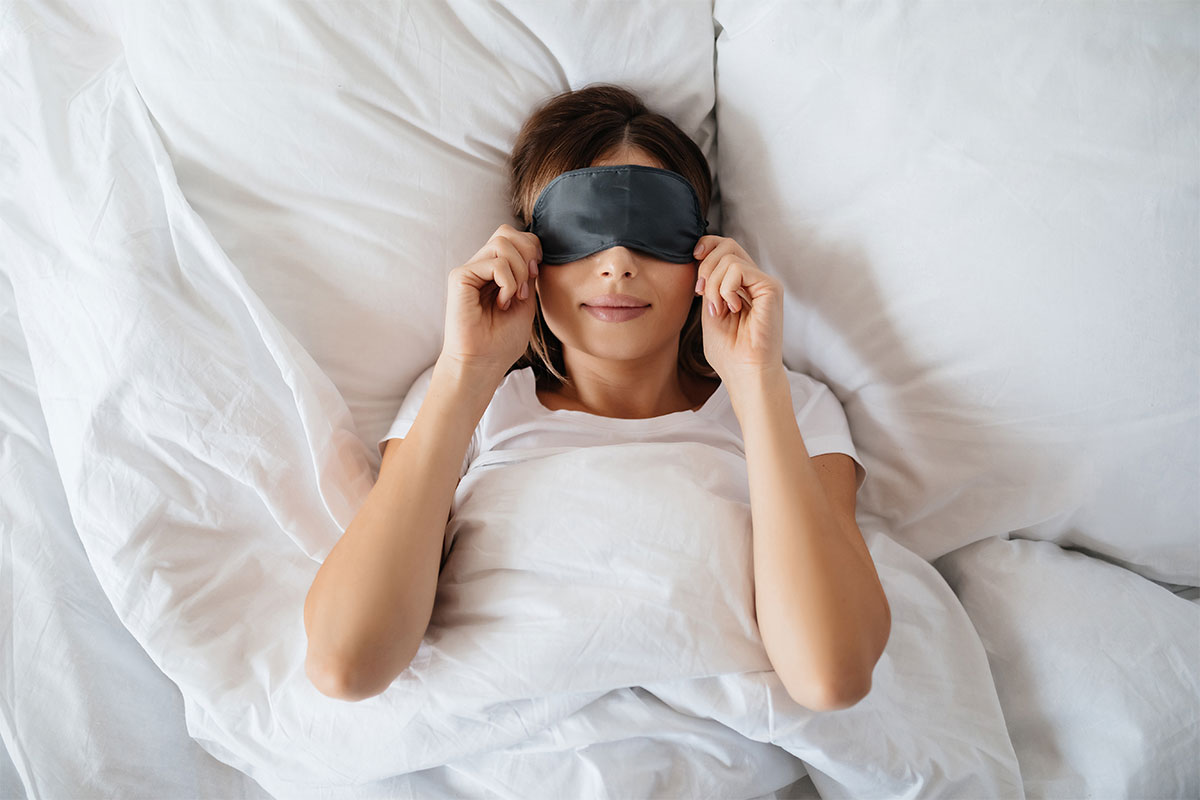
Some people travel to experience adventure and excitement. Others want to get away to relax and escape the stressors of daily life. Increasingly, exhausted people everywhere are planning vacations that will not just help them catch up on sleep, but also teach them how to sleep better when they get home. It’s no wonder why the latest trend in travel is sleep retreats.
The rise of sleep retreats
Rebecca Robbins, Ph.D., a sleep scientist at Brigham and Women’s Hospital, an assistant professor of medicine at Harvard Medical School and co-author of Sleep for Success! has helped create numerous sleep retreats around the world. She’s not surprised that sleep retreats are increasing in popularity. “The vast majority of Americans are falling short of their biological need for sleep, resulting in reduced performance and daytime functioning,” she says. “With so many falling short of their sleep need, it is possible that many of us could benefit from a retreat all focused on good sleep.”
Hilton’s 2024 Trends Report found that the primary reason people want to travel this year is to rest and recharge. “Personal wellness matters more than ever to travelers, and there is an increased focus on getting a good night’s sleep,” says Amanda Al-Masri, global vice president of wellness at Hilton. To help travelers sleep better, Hilton partnered with Robbins to “infuse evidence-based research and scientific insights into sleep programs” at hotels and resorts across the world.
Other hotels and resorts, such as Grand Velas Resorts, are following suit and creating sleep retreats as well. “We recognize the importance of sleep for cognitive performance, mood regulation and overall health and decided to offer a comprehensive sleep retreat experience to cater to the needs of guests seeking rejuvenation and relaxation,” says Silvia Velasco, the spa manager of SE Spa at Grand Velas Riviera Nayarit, who helped create the resort’s sleep retreats.
What happens at a sleep retreat?
Sleep retreats vary widely, but they are typically multi-night experiences that focus on getting better sleep, both during the retreat and after guests return home. Most sleep retreats are multifaceted and go beyond the typical advice to stop looking at screens before bed and avoid caffeine in the late afternoon.
A typical sleep retreat involves rooms that are specially designed with sleep-promoting elements such as blackout shades or mattresses with cooling properties, spa services such as sleep-promoting massages and educational components, such as lectures about sleep, Robbins explains.
Customized sleep solutions
Some sleep retreats involve personalized advice based on each participant’s lifestyle, sleep habits and needs. Many include numerous activities to promote relaxation, including meditation and mindfulness sessions, yoga or forest bathing. While some sleep retreats occur as a group during specific weeks, others are offered on-demand to individual guests.
At Hilton sleep retreats, participants engage in programming that encourages them “to be mindful of the factors throughout the day that can enhance or detract from a restful sleep,” Al-Masri said. An important part of Hilton’s approach to ensuring that guests get better sleep is “power-down amenities and activities that allow guests to unwind before bedtime and fulfill their unique sleep needs,” she says. For example, blackout curtains and dimmable lights create a calm environment. Some Hilton properties also feature “free-spirited” nonalcoholic alternatives to popular cocktails so guests can enjoy “the social experience without compromising on a restful night’s sleep,” Al-Masri explains.
Other sleep retreats focus more heavily on providing personalized advice using science-backed techniques. Canyon Ranch’s sleep retreats “include a sleep analysis and physician review to personalize the experience even further,” Mark Kovaks, Canyon Ranch’s vice president of health and performance explains. These retreats are led by leading sleep expert Dr. Michael Grandner, director of the Sleep and Health Research Program at The University of Arizona and director of the Behavioral Sleep Medicine Clinic at Banner-University Medical Center, and other experts.
What are the goals of a sleep retreat?
People seek out sleep retreats for different reasons. Some are overworked professionals who need a break, others are parents who haven’t gotten a good night’s sleep in months. Some want to catch up on sleep and others would like to reset poor sleep habits and learn how to get better sleep as part of a larger wellness journey.
No matter why someone attends a sleep retreat, Al-Masri explains that most sleep retreat participants want quality sleep during the retreat, to feel “rested and recharged,” and to leave “armed with exercises, best practices and insights to help achieve a better night’s sleep, whether traveling or at home.” According to Al-Masri, “the goal is for participants to achieve the recommended eight-10 hours of sleep per night,” during the retreat and when they go home. Kovaks concurs. “The ultimate goal is to awaken from each night’s sleep feeling more rested and with significantly more energy for the day,” he says.
At Grand Velas, the goal of sleep retreats for most guests is to “enhance sleep quality, reduce stress, increase energy levels and teach good sleep habits to help guests achieve better sleep and overall well-being,” Velasco says. When guests leave, most will have experienced “deep, restorative sleep” at the retreat, and they can go forth with the personalized tools to get the same type of sleep at home, she adds. Recommendations may include stretching exercises that promote sleep, breathing exercises, relaxation techniques and “other habits to incorporate into their daily routine for continued improvement in sleep quality,” Velasco explains.
Do sleep retreats help?
Hammer Tsui, a yoga instructor and co-founder of the blog A Fun Couple participated in a sleep retreat with her husband to “seek respite” from their hectic lives. Their retreat was held at the COMO Shambhala Estate in Ubud, Bali. During the retreat, Tsui says she and her husband “underwent personalized sleep assessments led by experienced therapists” and “gained valuable insights into our sleep patterns, identifying factors that were affecting our sleep quality, such as stress and irregular bedtime routines.”
The couple also learned mindfulness practices and gentle yoga routines that help promote sleep. Tsui says she didn’t sleep more than usual on the retreat, but instead focused on improving the quality of her sleep. She left “feeling refreshed, revitalized and inspired to prioritize self-care.” Since participating in the sleep retreat, Tsui explains that she and her husband have had “improvements in our sleep quality. We’re falling asleep faster, experiencing fewer disruptions during the night and waking up feeling more rested and relaxed.”
Relator Samantha Odo sought out a sleep retreat because “weekends with open houses and late-night paperwork” wreaked havoc on her sleep schedule. She participated in a weeklong sleep retreat in Napa, California. During the retreat, Odo engaged in a program designed to promote deep sleep. “We started each day with sunrise yoga in the fresh air, followed by amazing meditation sessions,” she says. Some evenings, Odo joined guided sleep meditations with lavender aromatherapy. “It wasn’t just about how much sleep I was getting, it was the quality. I felt genuinely rested, like my body had finally gotten a chance to recharge,” Odo says.
Impact on daily life
Even a year later, Odo says she is still reaping the benefits. She still does the bedtime stretches she learned at the retreat and incorporates other rituals she learned as well. She also revamped her bedroom at home by getting softer sheets like the ones they had at the retreat. “There are still nights when real estate keeps me up, but overall, that sleep retreat totally reset my sleep patterns, and for that, I’m eternally grateful,” Odo says.
Alternatives to sleep retreats
Sleep retreats appeal to many people, but they can be expensive. On the pricier end of the spectrum is a 25-day “Deep Sleep” private jet trip from TCS World Travel starting at $230,000 per person. Other sleep retreats are considerably less, but still cost thousands of dollars. The high price tag is understandable given that the retreats typically span several nights and may include personalized advice, spa treatments, meals and other experiences.
There are alternatives for those who want to create their own sleep retreats. Some properties offer amenities that promote better sleep outside of actual retreats. For example, the JW Marriott Tampa Water Street in Tampa, Florida, created “Stay Well Rooms.” These rooms are designed to promote sleep. Among other amenities, Stay Well rooms allow guests to set a lighting schedule to match their circadian rhythm, have relaxing aromatherapy scents and give guests access to an exclusive app designed by the Cleveland Clinic to promote good sleep.
Some hotels have created rooms that promote sleep with the entire family in mind. The JW Marriott Orlando Bonnet Creek Resort & Spa in Orlando, Florida has a select number of family suites designed with sleep promotion in mind. Amenities include nightlight soother owls and an in-room “Sleepy Snack” menu featuring items thought to promote sleep. Guests can add other sleep-promoting activities, such as massages or relaxing teas, to these types of DIY retreats.
Affordable options
Robbins says it’s also possible to create a simple but effective sleep retreat at home. “You could do a staycation sleep retreat where you take your weekend or days off and consciously block your calendar from social commitments, commit to having an early, light dinner, and avoid alcohol and screens close to bed,” she says.
Exhausted new mom Jessica Sillers did just that. She booked herself into a local hotel when her second child was 6 months old for the “sole purpose of resting without constant interruption.” Although Sillers would have liked to go on a sleep retreat that included massages and personal sleep advice, it wasn’t feasible at the time. “I brought my own soothing face mask and comfort snacks. After sleeping 11 hours the first night of her retreat, Sillers realized “how much sleep and mental health and mood are intertwined.” She has been making a greater effort to get more sleep ever since. “Sometimes the best you can do is cobble together a version of the ideal retreat you want,” Sillers said. Although Sillers would like to go on a sleep retreat one day, in her experience, DIY sleep retreats can help.
Sensei Lanai, A Four Seasons Resort, Lanai City, Hawaii
The five-night Rest and Recovery Program for One at Sensei Lanai, A Four Seasons Resort, includes a tailored itinerary focused on better sleep. A typical stay includes guided well-being consultations and spa treatments designed to promote rest and relaxation. The program includes other activities to encourage sleep, such as forest bathing and tai chi. Guests have a personal “sleep session” that analyzes their sleep patterns, sleep behaviors and other habits that impact sleep. Participants are then given evidence-based strategies to help them sleep better at home.
Grand Velas Riviera Nayarit, Riviera Nayarit Mexico
The Sleep & Retreat Getaway at Grand Velas Riviera Nayarit is a four-night retreat that includes a spa treatment designed to promote sleep, sound healing and guided meditation classes. The experience also includes unlimited access to the resort’s relaxing hydrotherapy ritual and a special nightly turndown service that prepares the suite for a rejuvenating night of sleep. To help promote better sleep at home, the retreat concludes with a personalized series of recommendations.
TCS World Travel, Multiple Locations
TCS World Travel’s 25-day “Deep Sleep” retreat focuses on connecting guests with their circadian rhythms for better sleep quality. This luxury sleep retreat takes guests by private jet to some of the most remote places in the world, from Tahiti to Sri Lanka. Many locations are dark sky destinations with little or no outside light pollution and designated quiet ecosystems.
YO1 Longevity and Health Resorts, Catskills, New York
The Insomnia Management program at this wellness destination focuses on reducing stress and solving sleep problems. Guests stay a minimum of three nights. Throughout that time, they are immersed in a tranquil environment to help make up for lost sleep. Relaxation treatments include massage, acupuncture, yoga and other activities to help promote better sleep. Guests also learn strategies to help them sleep better at home and encourage undisturbed sleep.
Castle Hot Springs Sleep Retreats, Morristown, Arizona
Castle Hot Springs hosts sleep retreats throughout the year. The specifics of each retreat vary, but all provide guests with access to the resort’s three hot springs with soothing mineral-rich desert spring water, spa services and personalized sleep advice. The goal is for attendees to leave with new skills to promote better sleep at home.
Grand Wailea, A Waldorf Astoria Resort, Maui, Hawaii
During a sleep retreat at the Grand Wailea, A Waldorf Astoria Resort, guests receive Kilolani Spa services to help them recover from jet lag, optimize circadian rhythms and release sleep-enhancing hormones. They will also participate in lectures about the science of restfulness, the foundations of sleep mechanics and sleep disorders. Participants will also design a personalized sleep plan that will include the practices they need to improve their daily routine at home.
Royal Champagne Hotel & Spa, Champillon, France
Just outside of Paris lies a tranquil resort with a Royal Sleep Experience. The individualized retreat includes an AIME sleep and glow set with a soothing essential oil spray and melatonin-based drops, an in-room meditation box, a satin face mask and luxurious linens that promote a good night’s sleep. The retreat also includes a menu specially created to promote rest, including a ‘Sleeping Beauty Mocktail.’ Guests receive a massage by candlelight to help improve sleep quality. This retreat has a two-night minimum but can be extended.
Canyon Ranch, Lenox, Massachusetts
The Canyon Ranch Mastering Sleep Immersion Retreat includes over a dozen expert-led presentations, a custom sleep analysis and nightly group relaxation programs. Participants can also participate in several activities to promote sleep, including a mental health and wellness consult, acupuncture or a Yon-Ka Relaxing Body Treatment.
COMO Metropolitan Singapore, Singapore
Guests at the three-night “Sleep Dreams” program at COMO Metropolitan Singapore stay in rooms designed to be cocoon-like havens that promote healthy sleep-wake cycles. The retreat includes access to high-tech sound technology to promote sleep. It also includes sessions in a hyperbaric oxygen wellness device, which may promote wellness and better sleep. Additionally, guests receive products such as the COMO Shambhala Sleep essential oil, balm and linen spray, which can help guests get a better night’s sleep.
Photo by AT Production/Shutterstock.com




